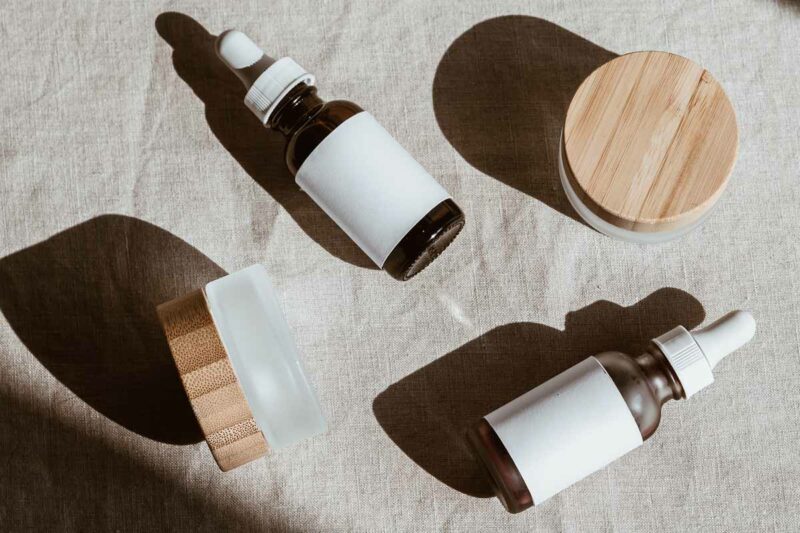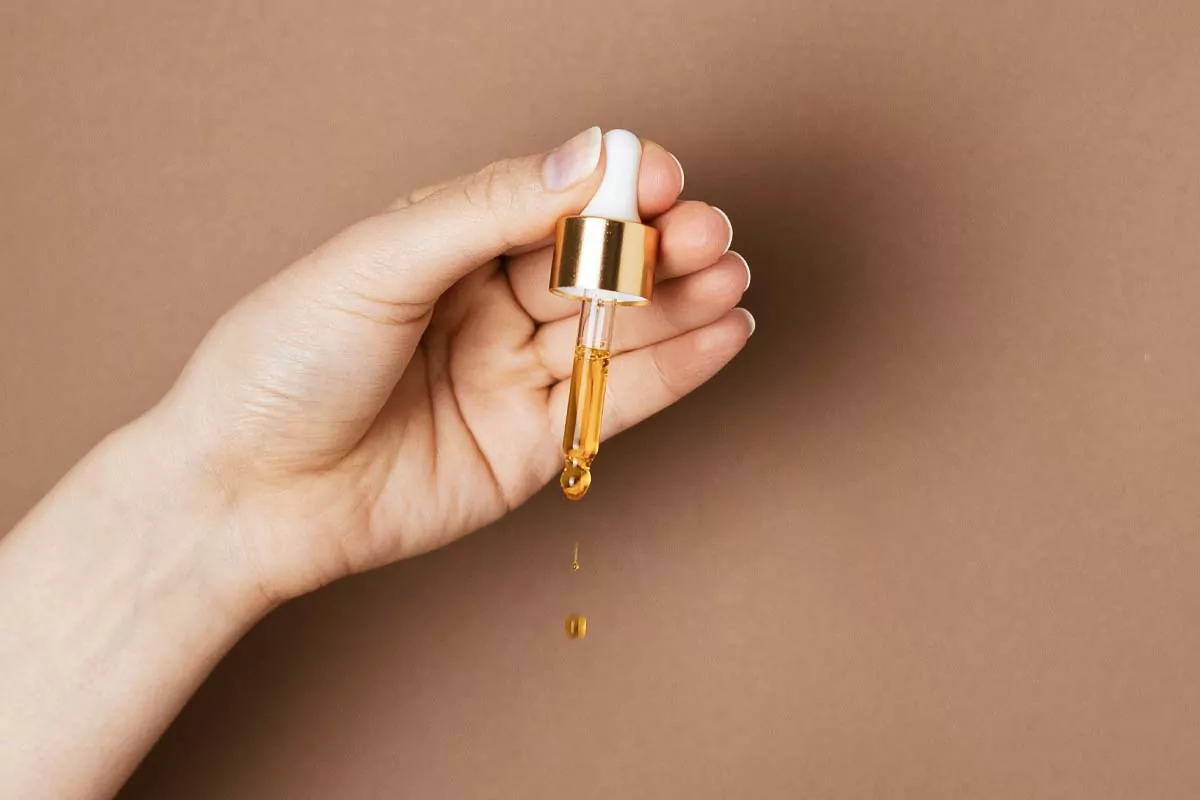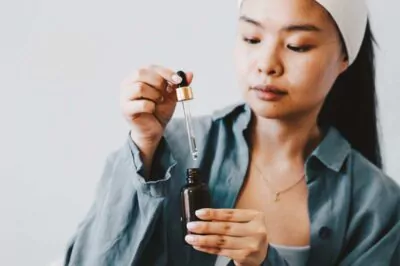Table of Contents[Hide][Show]
What Is Vitamin C?
You can’t walk through your local grocery store or makeup counter without spotting vitamin C on a lotion or concealer. What is vitamin C, though? Vitamin C is most commonly found as l-ascorbic acid, or a derivative of it, and comes in many different forms. From face washes to vitamin C serums, the ingredient is incredibly popular for its efficacy and its ability to address many different cosmetic concerns.
Benefits of Vitamin C for Skin Care

There are numerous benefits of incorporating vitamin C into your skin care routine. People and scientists alike rave about its ability to help address an array of cosmetic skin concerns. Whether you’re younger or wiser, struggle with stubborn skin concerns or are sensitive to the heavens, there’s a vitamin C formula that’s perfect for you and your unique skin needs.
Helps reduce temporary redness
If you’ve ever wondered who should use a vitamin C serum, the answer is almost everyone. It’s amazing for all ages, preteens and up, except maybe those with extremely sensitive skin. Those who are younger or struggling with oily skin can benefit by temporarily minimizing the redness that comes with agitated skin derived from clogged pores.
Helps fade the look of discoloration
Many of us know all too well how picked-at skin can leave behind the look of unwelcome dark spots. A good vitamin C serum when used regularly in conjunction with sunscreen can help fade the appearance of that discoloration over time for a more even-toned complexion.
Supports skin barrier
Studies have shown that vitamin C has properties that help reinforce the skin’s natural lipid barrier. In return, this helps prevent transdermal water loss and maintains that juicy, plump appearance we all love to see.
Targets the appearance of dark spots for a restored glow
While the team at Annmarie Skin Care believes that aging is a blessing, we also know our community enjoys having options when faced with the skin changes that accompany aging.
Besides healthy lifestyle choices and dutiful moisturizing, vitamin C is a lovely supportive skin care ingredient for mature skin types. Its capacity to lessen the appearance of dark spots to restore a radiant complexion is why you’ll often see vitamin C in anti-aging formulas for mature skin types.
Types of Vitamin C for Skin Care

Vitamin C comes in many different forms from supplements to serums and everything in between. What are the different types of vitamin C and how do you know which one works best for you? We’ve compiled a list, so get ready for some rapid-fire facts.
L-Ascorbic Acid
The most commonly found and studied form of vitamin C is l-ascorbic acid. If you have sensitized skin or use acids in your skin care routine, you may find this form irritating. L-ascorbic acid is water-soluble, oxidizing upon exposure to air and light, so it’s rather difficult and finicky to formulate for efficacy. Look for opaque, airtight bottles to ensure optimal potency.
Ascorbic Acid Polypeptide
A synthetic vitamin C derivative, ascorbic acid polypeptide is water-soluble, but also more formula stable than l-ascorbic acid. Created through the combining of l-ascorbic acid and peptides, ascorbic acid polypeptide is used for a brightening effect.
Ascorbyl Glucosamine
What do you get when you combine vitamin C and sugar? A derivative called ascorbyl glucosamine. Ascorbyl glucosamine is water-soluble and is commonly found in aqueous formulas. This form of vitamin C is not as commonly found and there is much less research behind ascorbyl glucosamine and its skin care benefits.
Ascorbyl Glucoside
Ascorbyl glucoside is a gentler derivative of vitamin C and used by skin types that can irritate easily. This type of vitamin C is used often in formulas to help brighten the look of one’s complexion.
Ascorbyl Palmitate
Ascorbyl palmitate is fat-soluble and can be absorbed through the skin easier than its water-soluble counterparts. A milder derivative of vitamin C, ascorbyl palmitate often comes from plant-based sources. This derivative is made by mixing corn dextrose fermentation and palm oil.
The ethics of sourcing palm oil is hotly contested as rainforests are destroyed to access the ingredient, causing disruption of biodiversity (specifically loss of orangutans) and emitting harmful pollution.
Magnesium Ascorbyl Phosphate
Shelf-stable in skin care formulations, magnesium ascorbyl phosphate hydrates. This form of vitamin C is added to water-based products for a temporarily soothing effect. However, the glow-giving properties are not as strong in this derivative.
Sodium Ascorbyl Phosphate
Used for oily and more sensitized skin types, sodium ascorbyl phosphate is a starting point for those looking to dip their toe into the world of vitamin C skin care with its mild formulation. You’ll find this ingredient in everything from shampoo to lipstick for its stability when exposed to air and light.
Tetrahexyldecyl Ascorbate
At Annmarie Skin Care, we are huge fans of tetrahexyldecyl-ascorbate (THDA to keep it simple) for its gentle, yet incredibly effective quality. THDA is an oil-soluble vitamin C that is extremely stable, while allowing optimal absorption through the dermis and epidermis due to its lipid properties. Your skin will drink it right up. Its optimal pH (5.5-7) allows it to be one of the most non-irritating forms of vitamin C on the market.
We, of course, included it in our most-popular glow-inducing products like our Concentrated Boosting Elixirs. The tetrahexyldecyl-ascorbate that we use is a MADE SAFE® approved ingredient—derived from glucose, a natural sugar obtained from non-genetically engineered vegetable starches. THDA is a more moisturizing derivative of vitamin C, and is great for dry and more mature skin types as it works compatibly with the vitamin E that exists naturally in your skin.
We also love THDA for the brightening, firming, and protecting effects it gives to the skin, especially if you have a busy schedule and need every skin care product to pack a punch.
Vitamin C Serums vs. Powders

You’re probably very familiar with vitamin C serums. It’s less widely known that there are also powdered versions of the ingredient available. Why would someone prefer a serum over powder or vice versa?
What’s a Vitamin C Serum?
The biggest difference between a vitamin C serum and a powder is the texture. A serum is aqueous by nature while powders are dry. Depending on the type of vitamin C you’re using, its strength and the formulation, you may find that a vitamin C powder can be more stable compared to a serum. Serums, however, are complex, activated formulas that are much more elegant in feel on the skin and, with the right high-quality formulation, can deliver radiant results.
Our Wild Fruit Serum–Brightening Facial Complex, for example, is a fan favorite for both its brightening properties and luxurious feel upon application.
What’s a Vitamin C Powder?
A vitamin C powder is going to be much more gritty in texture. With its versatile characteristic, vitamin C powder can be combined with many different types of skin care (lotions, toner, body creams), which makes it great for those who don’t want to buy a standalone vitamin C product.
As long as you can get past the initial rough feel and mixologist approach to application, you may find that vitamin C powders are a more suitable option for you, especially if you’re looking for something more shelf-stable.
How Does Vitamin C Serum Help Your Skin?

In the skin care world, there always seems to be a new super ingredient. Vitamin C has been able to stand the test of time because it has some truly amazing skin care benefits. By firming and illuminating the look of skin, this wonder ingredient helps give your complexion a natural glow and smooth appearance.
The ability to enhance the skin’s natural defenses and support the work of your sunscreen also makes vitamin C a great addition to your morning routine. Over time with consistency, applying vitamin C topically has been shown to reduce the look of enlarged pores (genetics determine the depth and width of pores).
Is Vitamin C Serum Good for Oily Skin?
Oily skin is a tricky issue to combat, as it can appear all over or in select areas. A good place to start is to determine your skin type. In many cases, the skin ends up overproducing oil due to improper moisturization.
If you do have oily skin, there are several ways vitamin C can help. The calming and soothing properties of a formula that works well with your skin can help restore the skin’s natural balance and replenish nourishment your skin has been craving. Many people will starve their skin of moisture, thinking it will remove the excess oil, but it actually does the opposite!
Is Vitamin C Serum Good for Sensitive Skin?
Vitamin C is a very potent ingredient, but you may be wondering, “is vitamin C serum beneficial for sensitive skin?” That’s why there are so many different types of derivatives, since not every skin type can tolerate pure l-ascorbic acid.
If you tend to sway towards sensitized skin, you absolutely can try out vitamin C. Just keep in mind to:
- Find the vitamin C that works best for sensitive skin (we are big proponents of Tetrahexyldecyl Ascorbate)
- Incorporate any new product into your routine slowly
- Use a natural sunscreen daily
- Patch test before first use
- Use without other activated ingredients (if you use vitamin C in the morning, use other activated ingredients in the evening, etc.)
Can Vitamin C Serum Lighten Skin?
Vitamin C will not lighten your skin shade. This misconception probably comes from the fact that with the right formula and strength, vitamin C can be a wonderful aid in brightening, fading away the look of dark spots and overall evening out the appearance of your skin tone.
Vitamin C Serum for Clogged Pores
Clogged pores can be caused by a whole host of factors and often are accompanied by other skin concerns like temporary redness and the look of textured skin. Vitamin C serums are a wonderful solution for those experiencing clogged pores or oily skin types. The ingredient helps reduce temporary redness and is full of antioxidants that help plump, clarify and visually smooth the illusion of enlarged pores.
Vitamin C Protects From Environmental Stressors
Vitamin C does indeed help protect your skin from environmental stressors by boosting your skin’s natural defenses with its rich antioxidant property. Because our skin can be affected by harsh elements outside of our control, introducing a vitamin C product into your skin care regimen is a wonderful, proactive way to shield the skin.
However, it is important that you still layer on your dedicated sun protection product! For added protection, don’t forget your natural sunscreen and wear a wide-brim hat after you apply your vitamin C.
What Age Should You Start Using Vitamin C Serum?
As babies, many of our parents would slather us in creams after bathtime. So the concept of skin care starts almost at birth. Vitamin C is a strong ingredient and while incredibly effective, may be too intense for skin younger than pre-teen or those heading into puberty.
The most important habit to build at this developmental time is a solid, but basic skin care routine. The bare bones of a good introductory routine are:
For AM:
- Cleanser
- Moisturizer
- Sunscreen
For PM:
- Cleanser
- Serum
- Moisturizer
Once young preteens and teens perfect the basics, then it’s a good idea to slowly start trying to find a suitable vitamin C serum formula for their skin type and learning how to apply it correctly.
How To Choose the Right Vitamin C Serum for Your Skin

Choosing the best vitamin C serum for your skin includes several different factors. To help narrow down the decision fatigue, we’ve compiled a short list of things to keep in mind as you shop:
- Know Your Skin Type
It’s really helpful to understand your skin type when hunting down your ideal vitamin C serum. You’ll want to look for a more hydrating formula (one that includes ingredients like aloe, saccharide isomerate, glycerin, or hyaluronic acid) if you have dehydrated skin. If you have combination or oily skin, you can typically go for a stronger percentage of vitamin C.
- Consider Which Skin Concerns You Want to Address
What results you’re looking to get out of your vitamin C serum will play a big factor in the product you choose. Here At ASC, we choose THDA as our vitamin C derivative for its incredibly gentle, yet effective ability to add a glowy, plump appearance to the skin.
Because it’s oil-soluble and shelf stable, this form of vitamin C is versatile enough to address a slew of common skin concerns, like the appearance of fine lines and dark spots, regardless of skin type.
- Keep in Mind Your Lifestyle
When it comes to buying any skin care, you want to think about your day-to-day lifestyle. If you’re always in a rush to get out the door in the morning, you’ll want a fast-absorbing formula that layers well under makeup.
Packaging is an important thing to consider, as well. Bringing all of your skin care with you may not be the most practical if you’re constantly jet-setting. Instead you may enjoy carrying your Brighten Concentrated Boosting Elixir to boost your existing serum or facial oil with vitamin C!
How To Use Vitamin C Serum Effectively

Vitamin C is a very reliable ingredient with countless studies to verify its many benefits. There are a few steps to keep in mind to get the most out of your product. To optimize your vitamin C serum results, make sure you are using it efficiently.
When To Use Vitamin C Serum
- Find a formula that is right for your skin type and lifestyle
- Apply after toning mist, while skin is still damp for better serum absorption and before your moisturizer.
- Avoid mixing vitamin C with ingredients like acids, retinol or retinol-alternatives, etc. in one single skin care session. If you are incorporating acids or retinol-alternatives into your regimen, apply acids and retinol-alternatives in the evening and vitamin C in the mornings.
- In the morning, use your vitamin C product of choice under sunscreen.
How Do You Know if Vitamin C Serum Is Working?
You should notice a radiance or glow to your skin and a smoother texture after a few weeks.
How Long To See Vitamin C Results
All skin types are unique, so the speed of results will vary. Most people can begin to see their vitamin C serum working in as little as two weeks. Patience is key though, as skin care can take up to eight weeks to show full results. Consult with your esthetician or medical physician with any questions you may have.
How Often Should You Use Vitamin C on Your Face?
Many vitamin C formulas are created to be used daily and are often advertised to be used in the morning due to their antioxidants that pair well with the efforts of your sunscreen. It’s a good idea to start off using a serum every other day to avoid the potential for irritation until you know how your skin reacts to the vitamin C product you’ve selected.
Ingredients That Go Well With Vitamin C
Vitamin C is very strong and effective on its own, but some with more resilient skin and established skin care routines may enjoy adding additional ingredients.
Mixing Glycolic Acid and Vitamin C
When it comes to skin care, more is not always better. It’s not a good idea to mix glycolic acid and vitamin C, as the ingredients are too potent on their own. Mixing them would put most skin types at risk of irritation. Glycolic acid is a very strong ingredient and when used at a high percentage or too frequently, it can dry out the skin.
Here at ASC we have found great results with more gentle acids like lactic acid, which is also in the alpha hydroxy acid (AHA) family. If you have found a vitamin C and an AHA you like (whether it be lactic acid or glycolic acid), to get the most out of each ingredient we recommend you:
- Apply a vitamin C serum in the morning and your glycolic acid at night (though we recommend using a gentler, more hydrating acid, like a honey-derived lactic acid, as featured in our Resurfacing Facial Exfoliant).
- Alternate every other night with a glycolic acid (or a gentler alpha hydroxy acid) until tolerance is built up, especially if you have sensitive skin.
AHAs, BHAs and Vitamin C

Are you curious if you can combine AHAs, BHAs and vitamin C? You can, but be cautious if you have not used any or all three before. These ingredients are amazing for giving the skin a lit-from-within glow but can irritate when combined if your skin isn’t properly adjusted.
- Use a vitamin C serum in the morning and save the exfoliating acids for night.
- Always use a non-toxic sunscreen and wear additional sun protection—like a wide-brimmed hat—to keep skin in shade, especially after an acid was applied the evening before.
- Always patch test new ingredients on your skin to check for any allergies or unwanted irritation.
Vitamin C and Retinol Together
Layering vitamin C and retinol together does not add any overwhelming benefits to the skin. Since they are both considered activated ingredients, they work best if used separately to be the star of your routine. With the potential long-term risks associated with retinol use, Annmarie Skin Care offers a MADE SAFE® bioactive A-complex retinol alternative, Revitalize Concentrated Boosting Elixir, that is both safe for you and delivers results.
If you are looking to use both a retinol-alternative and vitamin C product in your routine, use the vitamin C product in your morning routine and the retinol-alternative in your evening routine.
Mix Hyaluronic Acid With Vitamin C
Can you mix hyaluronic acid with vitamin C? Yes! It’s highly recommended. Hyaluronic acid is a humectant and draws in moisture from the air or any products layered on top of it. Since the ingredient draws in moisture and makes everything after it absorb better, make sure to apply it first and then layer a moisturizing vitamin C product on top to lock in the hydration and nutrients in your skin.
Some of our favorite ways to incorporate these two ingredients are:
- Applying a serum that features both hyaluronic acid and vitamin C (so that you can get both of these benefits in one step)
- Blend a few pumps of a serum with hyaluronic acid and 1-3 drops of our Brighten Concentrated Boosting Elixir that features vitamin C with sea buckthorn and apply in one step.
- Apply a hyaluronic acid serum first. Then, blend 1-3 drops of Brighten Concentrated Boosting Elixir with your facial oil and apply your vitamin C boosted moisturizer.
Vitamin C and Niacinamide Together
Do vitamin C and niacinamide work together? Yes, vitamin C and niacinamide can benefit your skin when combined. Both help temporarily minimize the redness that comes from stressed skin, and both help lessen the look of uneven color on the skin. Vitamin C and niacinamide help balance the skin’s natural oils, which is great news for those with oily skin types. Mature skin will like that vitamin C and niacinamide both give an appearance of firmer, more plump skin.
If you have really sensitive skin, it may be a good idea to use one or the other to minimize the potential of overwhelming the skin with too many actives.
Side Effects of Vitamin C Serums
A side effect of vitamin C is that it can cause sensitized skin in those with a more delicate skin type. Can vitamin C darken your skin? No, vitamin C cannot darken your skin. What many people may see as darkening is in fact staining from an expired formula.
Most formulas on the market are carefully developed to remain incredibly stable and not oxidize on the skin, so it would be uncommon for vitamin C to darken, aka stain the skin. That orange hue you may have seen could be the result of an older, oxidized formula clinging to drier patches of skin on your face.
How do you prevent vitamin C from staining your skin? Make sure you have evenly exfoliated your skin and that your vitamin C product is fresh and not close to expiration. Commonly-sold vitamin C formulas today do not stain the skin unless the product specifically states that it has self-tanning properties.
Homemade Vitamin C Face Serum
Vitamin C is very strong, and can be a temperamental ingredient. Skin care companies pay big money to get their formulations just right so as to be shelf-stable and give results. If you have your heart set on making your own homemade vitamin C face serum, there are a few factors to keep in mind:
- Patch test for skin irritation
- Use an opaque bottle (like amber or miron) to prevent oxidation
- Store in a cool, dark place or keep in refrigerator for freshness
- Discard after two weeks (as the product may oxidize and become ineffective)
Annmarie Skin Care’s Vitamin C Serum

When it comes down to it, the right vitamin C serum for you is the formula that works for your lifestyle and skin type. If your skin is incredibly sensitive or you’re simply looking for a vitamin C product with ingredients that are consciously sourced and safe for you and the long-term health of your skin, a more gentle derivative of vitamin C might work best.
Our team here at Annmarie Skin Care believes in the importance of research and knowing where products are sourced from. If you’re looking for a vitamin C serum or brightening elixir that can help you achieve the high-quality results you want, we have just the nourishing, effective vitamin C formulation for you!
Check out our vitamin C-rich serums and elixirs:








Leave a Reply